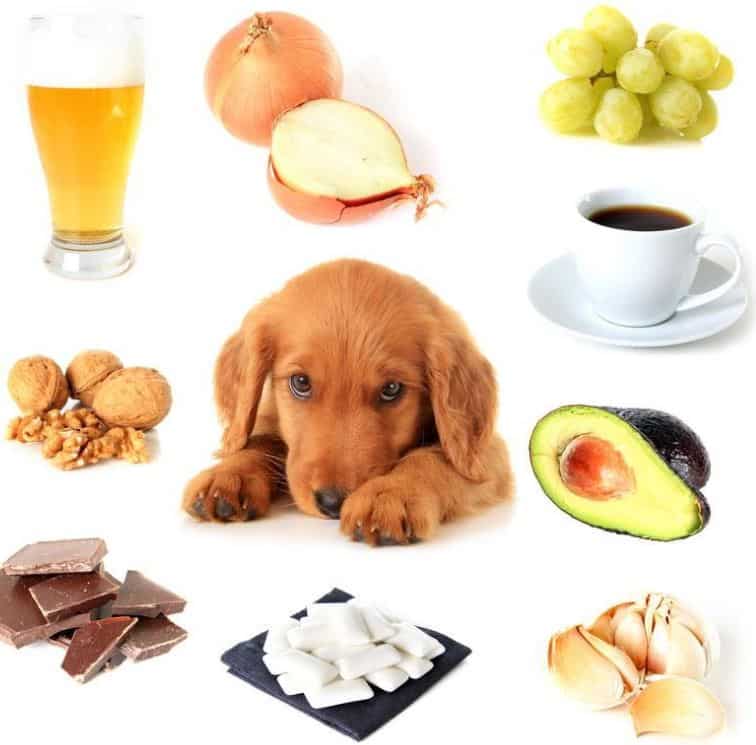At North Bundaberg Vet Surgery, we’d like to let our valued clients know that we will be closed for the Christmas holidays from Christmas Day, Monday the 25th of December, through to Sunday the 29th of December. We’ll be back on Monday the 30th, ready to care for your furry family members. During this festive season, we’d also like to remind pet owners of a few important tips to keep your pets safe: watch out for heatstroke in the summer heat—ensure they have plenty of shade and water; avoid feeding pets Christmas leftovers like chocolate, cooked bones, and fatty foods, which can be harmful; and be mindful of holiday hazards such as tinsel, ribbons, and electrical cords.
Category: vet blog
WELCOMING THE NEW YEAR WITH GRATITUDE
Dear Cherished Clients,
As the vibrant colours of the New Year unfold, we find ourselves reflecting on the immense joy of serving the wonderful pets and their caring families that make our days at North Bundaberg Vet Surgery so fulfilling.
As we step into this new chapter, our hearts overflow with gratitude for each wag of a tail, each comforting purr, and every feathered friend that graces our practice. Your trust in us to care for your beloved companions is an honour we deeply cherish.
The past year has been one of shared triumphs, where together, we navigated uncertainties and celebrated victories, all centred around the health and happiness of your cherished pets. Your support and loyalty have been the cornerstone of our journey, and for this, we extend our sincerest gratitude.
Looking Ahead
With the dawn of this New Year, we embrace the opportunity to continue providing the highest standard of care, and compassion to your furry, feathered, or whiskered family members. We’re excited about the possibilities ahead, striving to enhance our services and uphold the trust you place in us.
A New Year’s Wish
May this year be filled with wagging tails, gentle purrs, and joyful chirps. May your homes be adorned with the love and companionship of your pets, and may their health and happiness continue to bring warmth and light to your lives.
Grateful for Each Step Together
Thank you for entrusting us with the care of your beloved pets. Your presence in our veterinary family is deeply appreciated, and we eagerly anticipate the opportunity to continue nurturing this bond in the coming year.
Warmest Wishes for 2024
From all of us at North Bundaberg Vet Surgery, we wish you a splendid New Year filled with prosperity, health, and the unwavering love of your furry companions.
Warm Regards,
The Team at North Bundaberg Vet Surgery
ENSURING A SAFE AND MERRY CHRISTMAS FOR YOUR FURRY FRIENDS
‘Tis the season to be jolly! As we adorn our homes with glittering decorations and indulge in festive treats, let’s not forget our beloved pets who make our holidays even brighter. Amidst the joyful celebrations, it’s essential to ensure our furry companions stay safe and healthy during this merry season.
The Magic of Christmas for Our Pets
The twinkling lights, the aromatic scents, and the overall cheerful atmosphere of Christmas can captivate our furry friends as much as it does us. Dogs wag their tails at the sight of beautifully wrapped presents, cats curiously bat at ornaments adorning the tree, and even birds chirp along to the merry tunes playing in the background. This time of year brings joy and a unique sense of togetherness for the whole family, including our pets.
Potential Hazards Lurking Around the Christmas Tree
However, amidst the festive joy, there are hidden dangers that pet owners should be mindful of:
-
- Decorations: Tinsel, ornaments, and ribbons may add sparkle to your tree, but they pose a serious risk if ingested by pets. These can cause intestinal blockages or other digestive issues.
- Christmas Plants: Mistletoe, holly, and poinsettias are commonly used for decorations but can be toxic to pets if consumed. Keep them out of reach.
- Festive Food: The irresistible aroma of holiday feasts might tempt your pets, but some foods like chocolate, grapes, raisins, and certain nuts are toxic to them.
- Electrical Cords: Pets might chew on cords from festive lights, leading to electric shocks or injuries
Tips for a Safe and Happy Holiday Season
To ensure a joyful and hazard-free Christmas for your pets:
- Secure Decorations: Hang ornaments higher on the tree where pets can’t reach, and avoid using tinsel or small, breakable decorations.
- Pet-Friendly Plants: Opt for pet-safe alternatives like Christmas cacti or pet-friendly artificial plants to adorn your home.
- Mindful Feasting: Keep holiday treats away from pets and ensure garbage bins containing food scraps are secured.
- Cord Management: Tape down or cover electrical cords to prevent pets from chewing on them.

Clinic Closure for the Holidays
As much as we love caring for your furry companions, please note that our clinic will be closed for the Christmas holidays. Our closure will be from Friday, December 22nd, through Tuesday, December 26th. We encourage our clients to ensure they have adequate supplies of any medications or pet essentials needed during this period.
Conclusion
Christmas is a time for celebration and spreading cheer, and with a little precaution and care, it can be a joyful time for your furry companions too. By being mindful of potential hazards and considering our holiday closure, pet owners can ensure that the holidays remain a safe and festive time for everyone, including our four-legged friends.
Wishing you and your pets a paws-itively wonderful Christmas filled with love, joy, and safety!
PROTECTING YOUR PET: UNDERSTANDING THE SUMMER THREAT OF FLEAS AND TICKS IN BUNDABERG
As the sun shines brighter and the temperature rises in Bundaberg, our furry friends are eager to explore the outdoors. However, with the warmth of summer also comes a lurking threat: fleas and ticks. These tiny pests may seem insignificant, but they pose serious dangers to the health of your beloved pets.
Understanding the Threat: Fleas and Ticks
Fleas and ticks are more than just nuisances. They’re carriers of diseases that can severely impact your pet’s health. In Bundaberg’s warmer climate, they thrive, making prevention a crucial aspect of your pet care routine.
Risks Associated with Fleas and Ticks
Health Complications: Fleas and ticks can cause various health issues in pets, ranging from skin irritations, allergic reactions, and infections to more severe conditions like Lyme disease, anaplasmosis, and Rocky Mountain spotted fever.
Anaemia: Fleas, especially in large numbers, can cause anaemia in pets, particularly in puppies and kittens. This condition can lead to weakness, lethargy, and even life-threatening complications if left untreated.
The Significance of Paralysis Ticks
Among ticks, paralysis ticks hold a particular danger due to the toxin they inject while feeding on the pet’s blood. This toxin can lead to paralysis, respiratory distress, and, in severe cases, death. While less common, paralysis ticks require prompt identification and removal.
Prevention Tips
Regular Check-ups: Schedule routine check-ups at North Bundaberg Vet Surgery to ensure your pet is free from these parasites. Inquire about a comprehensive prevention plan that includes protection against fleas, ticks, and specifically, paralysis ticks.
Use Preventive Medications: We here at North Bundy Vet Surgery can recommend and provide to you the right preventive products suitable for your pet’s age, size, and health condition. From spot-on treatments to collars and oral medications, various options are available for effective prevention.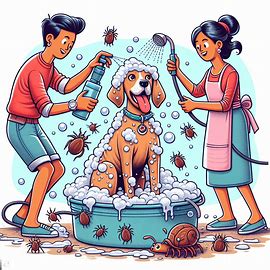
Environmental Care: Maintain a clean environment by regularly vacuuming and cleaning your home, pet bedding, and yard. This helps eliminate flea eggs and larvae, reducing the risk of infestation.
Recognizing Signs of Infestation
It’s essential to be vigilant and watch out for signs of fleas and ticks on your pets:
- Excessive scratching or biting at the skin
- Redness or inflammation on the skin
- Visible pests on the fur or skin
- Restlessness or discomfort in your pet
Conclusion
Summer in Bundaberg should be a time of joy and adventure for both you and your pets. By staying proactive and taking preventive measures against fleas and ticks, including being mindful of the dangers posed by paralysis ticks, you can ensure your furry companions enjoy the season to the fullest while staying healthy and happy.
Remember, for any concerns or for guidance on the best preventive measures for your pet, don’t hesitate to reach out to us at North Bundaberg Vet Surgery. Together, let’s keep our pets protected and thriving this summer!
UNDERSTANDING AND MANAGING SEPARATION ANXIETY IN DOGS AND CATS: INSIGHTS AND STRATEGIES FOR PET OWNERS
Introduction:
Separation anxiety isn’t exclusive to dogs; our feline companions also experience distress when apart from their owners. At North Bundaberg Vet Surgery, we recognize the significance of understanding and managing separation anxiety in our beloved pets. This article aims to shed light on this common issue, offering insights and strategies to help pet owners alleviate their pets’ distress.
Understanding Separation Anxiety:
Triggers and Causes: Both cats and dogs can develop separation anxiety due to similar triggers, including changes in routine, past traumatic experiences, or lack of socialization.
Symptoms of Separation Anxiety: Understanding these distinct manifestations is crucial for identifying and addressing separation anxiety in our beloved pets effectively. By recognizing these specific behaviours in dogs, such as pacing, panting, excessive barking or attempting to escape, and in cats, including excessive meowing, urinating outside the litter box, or aggression towards other pets, pet owners can take proactive steps to alleviate their pet’s distress and foster a more comfortable environment in their absence.
Managing Separation Anxiety:
Establishing a Safe Environment: Create safe spaces equipped with familiar scents, toys, and comfortable bedding to alleviate anxiety in your absence.
Gradual Departures and Reintroductions: Incrementally increase time apart to build their confidence and reassure them of your return.
return.
Behavioral Training: Employ positive reinforcement techniques tailored to their specific needs to help them cope with separation.
Professional Guidance: Seek veterinary advice from our experts at North Bundaberg Vet Surgery for personalized strategies and support.
Conclusion:
Understanding and managing separation anxiety in pets requires patience, empathy, and tailored approaches. At North Bundaberg Vet Surgery, our commitment extends to the well-being of all pets. We offer compassionate care and expert guidance to help pet owners navigate separation anxiety, ensuring a harmonious bond between them and their beloved companions.
Contact Us:
North Bundaberg Vet Surgery 29 Queen Street, North Bundaberg, Queensland,
Phone: 4151 3688
By comprehensively addressing separation anxiety in pets, we aim to support pet owners in providing the best care for their furry companions.
SILENT THREATS DOWN UNDER: UNRAVELLING THE DANGERS SNAKES POSE TO PETS IN AUSTRALIA
As devoted pet lovers, we understand the deep bond you share with your canine companions. In the serene landscape of Bundaberg, Queensland, encounters with snakes are not uncommon. At North Bundaberg Vet Surgery, we’re dedicated to raising awareness about the potential dangers these reptiles pose to our four-legged friends. In this Article, we’ll delve into the risks associated with snake encounters and how to protect your beloved animals.
The Presence of Snakes in Queensland: Queensland boasts a rich biodiversity that includes a variety of snake species. While many snakes are harmless, some are venomous and can pose a significant threat to pets. The Eastern Brown Snake, Coastal Taipan, and Red-bellied Black Snake are among the venomous species found in our region.
Understanding the Risks: Dogs and cats, by nature, are curious and may not hesitate to investigate unfamiliar creatures, including snakes. Venomous snake bites can have severe consequences for your furry companions, leading to symptoms such as swelling, lethargy, vomiting, and difficulty breathing. Untreated bites can be fatal.
Common Scenarios of Snake Encounters: Snakes are often found in warm and sunny environments, making encounters more likely during the warmer months. Areas near water sources, gardens, and even urban spaces can become snake habitats. Pets exploring these areas are at an increased risk.
Signs of a Snake Bite: It’s crucial f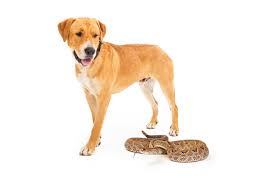 or Pet owners to recognize the signs of a snake bite promptly. If your Pet displays symptoms like sudden weakness, drooling, dilated pupils, or vomiting, seek immediate veterinary attention. Time is of the essence in treating snake bites, and early intervention can significantly improve outcomes.
or Pet owners to recognize the signs of a snake bite promptly. If your Pet displays symptoms like sudden weakness, drooling, dilated pupils, or vomiting, seek immediate veterinary attention. Time is of the essence in treating snake bites, and early intervention can significantly improve outcomes.
Preventive Measures: Prevention is the key to keeping your furry friend safe. Consider the following measures:
- Yard Maintenance: Keep your yard tidy, minimizing and where possible, removing places where snakes can hide.
- Leash Control: Keep dogs on a leash, especially in areas known for snake activity.
- Training: Train your dog to avoid unfamiliar creatures and to respond to commands promptly.
- Be Aware: Familiarise yourself with common snake habitats such as gardens, bushland, and areas near water sources to reduce the risk of encounters.
First Aid for Snake Bites: In the unfortunate event of a snake bite, remember these first aid steps:
- Stay Calm: Keep yourself and your pet as calm as possible.
- Restrict Movement: Limit your pet’s movement to slow the spread of venom, if you are able it is best to carry your animal.
- Contact Your Nearest Vet: Immediately proceed to the nearest veterinary clinic, if possible, ring ahead to let the clinic know you are coming so they can prepare to treat your pet as quickly as possible.
As responsible pet owners, it’s our duty to be vigilant and proactive in safeguarding our pets from potential dangers. At North Bundaberg Vet Surgery, we’re here to assist you with any concerns about snake encounters and the well-being of your pets. Together, we can create a safer environment for our furry companions, ensuring they live happy and healthy lives.
For inquiries or assistance, contact us at 4151 3688 or visit our clinic at 29 Queen Street, North Bundaberg. Your pet’s safety is our priority.
PROTECTING YOUR CANINE COMPANIONS: IDENTIFYING DANGEROUS FOODS FOR DOGS
As pet owners, we all love to indulge our furry friends with tasty treats from time to time. However, it is crucial to remember that not all foods are safe for dogs, and some can be downright dangerous to their health. At North Bundaberg Vet Surgery, we are committed to the well-being of your canine companions. In this article, we aim to educate pet owners about the perilous foods that should be kept far away from our beloved dogs.
1. Chocolate: A Bitter Sweet Temptation
Chocolate is a delectable treat for humans but a potential hazard for dogs. It contains substances called theobromine and caffeine, both of which are toxic to canines. Ingesting chocolate can lead to symptoms such as vomiting, diarrhoea, rapid breathing, increased heart rate, seizures, and, in severe cases, even death. Dark chocolate and cocoa powder contain higher levels of theobromine and are especially dangerous. Be vigilant and keep all forms of chocolate out of your dog’s reach.
2. Grapes and Raisins: A Tiny Fruit with a Big Threat
Grapes and raisins may seem harmless, but they can have dire consequences when consumed by dogs. These fruits can lead to kidney failure in dogs, even in relatively small amounts. Symptoms of grape or raisin toxicity include vomiting, diarrhoea, lethargy, and loss of appetite. Ensure your dog stays away from these foods, including dishes that contain them, such as grape salad or raisin bread.
3. Onions and Garlic: Hidden Dangers in the Kitchen
Onions and garlic, common ingredients in many human dishes, are toxic to dogs. They contain compounds that can damage a dog’s red blood cells, leading to anaemia. Symptoms of onion and garlic poisoning in dogs may include weakness, vomiting, diarrhoea, and difficulty breathing. Keep these ingredients out of your dog’s reach and ensure that they do not accidentally ingest any food containing onions or garlic.
4. Xylitol: The Silent Sweetener Threat
Xylitol is a sugar substitute commonly found in sugar-free gum, candies, and some baked goods. While it’s safe for humans, it’s incredibly toxic to dogs. Ingesting xylitol can cause a rapid release of insulin, leading to hypoglycaemia (low blood sugar). This condition can result in seizures, loss of coordination, and, in severe cases, liver failure. Always double-check ingredient labels to ensure your dog is not exposed to xylitol-containing products.
5. Alcohol: Never a Party Favour for Pets
Alcohol consumption can lead to severe health issues in dogs. Even small amounts can cause symptoms like vomiting, diarrhoea, coordination problems, and incoordination. Ingesting larger quantities can result in alcohol poisoning, which can be life-threatening. Never leave alcoholic beverages unattended, and make sure your dog doesn’t have access to them during gatherings or parties.
Conclusion
Our furry friends bring joy and companionship into our lives, and it’s our responsibility to ensure their safety and well-being. Understanding the dangers of certain foods is crucial in protecting our beloved pets from potential harm. At North Bundaberg Vet Surgery, we’re here to provide guidance and care for your pets. If you suspect your dog has ingested any of these dangerous foods or is experiencing symptoms of poisoning, contact your veterinarian immediately. By staying informed and taking preventive measures, we can keep our canine companions safe and healthy for years to come.
HEARTWORM – IS YOUR DOG AT RISK?
We have been seeing quite a big increase recently in the amount of dogs who are testing positive for heartworm and therefore we thought it very timely to share some information with our clients to help understand the importance of prevention in controlling heartworm.
Did you know that just one bite from a mosquito can give your dog heartworm? It is spread between dogs by mosquitos and one bite is all it takes. Through that bite, your dog can get infected with young heartworms that can develop and eventually grow up to 30cm long in the heart and lungs. This leads to heart failure, lung disease, organ damage and death.
The Heartworm Lifecycle (5-6 months)
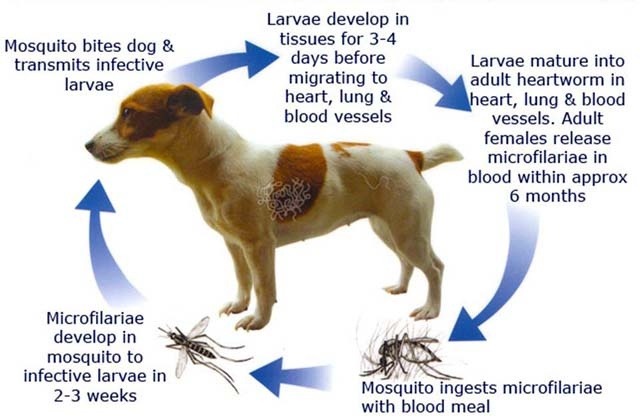
Heartworm disease is a risk through all of Australia.
It is possible to treat heartworm infection, but the treatment program is expensive and can cause serious complications. Prevention is definitely better than cure.
Protecting your dog from Heartworm
There are a number of ways to protect your dog from heartworm. One option is to give monthly treatments to your dog, and these often include flea and tick prevention as well as treating some intestinal worms. However forgetting monthly treatment is one of the leading causes of deadly heartworm disease in dogs.
If you think you might forget to give your dog their heartworm prevention every month, there is a year-round prevention (given by injection) available which can be administered at our clinic simply by making an appointment with one of our vets.
Testing for heartworm is recommended when heartworm prevention is unknown or lage. Testing is performed in the clinic and only requires a small blood sample from your dog. Results are known within minutes.
If you would like to make an appointment to have your dog tested for heartworm, please just phone and we can make an appointment for you.
Please call us anytime if you would like to know more about this protection, or if you have any questions at all about your pet’s health.
IS YOUR DOG “SCOOTING”? IT COULD BE THEIR ANAL GLANDS.
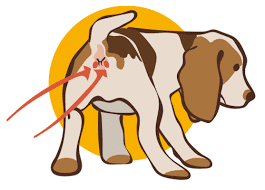 A very common problem we see in vet clinics are dogs who have been “scooting” their bottom along the ground.
A very common problem we see in vet clinics are dogs who have been “scooting” their bottom along the ground.While it can be worms, it can just as often be impacted anal glands. It is quite a simple procedure for a nurse or vet to express anal glands and gives immediate relief to your pet.
If your pet has been “scooting” and you are unsure why, it is a good idea to have a consultation with one of our vets initially so that they can assess what is going on. However if it is a recurring issue, it is simply a matter of making an appointment with one of our nurses to have this procedure done.
It is very common in smaller breeds of dog (although it can happen with any size or breed of dog) and symptoms can include:
- Scooting – rubbing the bottom (anus) on the ground.
- A foul, fishy smell.
- Nibbling and licking the anus and/or lower back.
- Pain when pooing.
- Suddenly sitting down in discomfort.
- Looking round at their back end suddenly.
Please phone us anytime and talk to one of our friendly and knowledgeable staff. We are here to help.
Welcome to our new vet – Dr. Derek Lamb!
We have been very fortunate to have Derek Lamb join our team. Derek comes with a wealth of experience. He graduated as a veterinarian in South Africa over 20 years ago. When he is not working he enjoys snorkelling and being with his family and pets. He has fit seamlessly into our team here and we are very happy he decided to join us.


